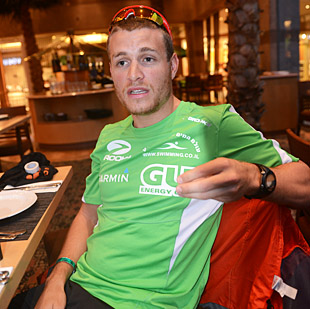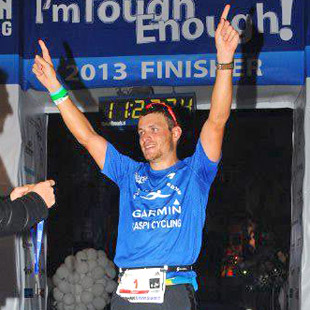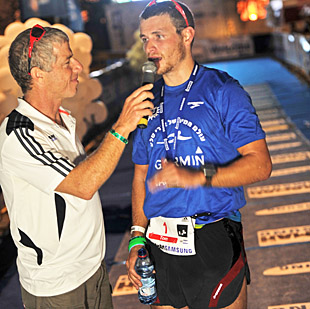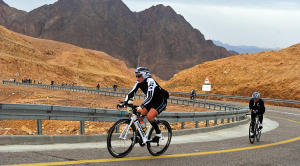
For most of the millions of triathletes worldwide, the sport offers a welcome respite and sanctuary from the cloud of world tensions, the strident voice of political division and the stresses of modern life. The same goes for the determined triathletes of Israel, one of the world’s flashpoints of international divisions, home to three of the world’s great religions’ holiest shrines. It is a state in a constant state of alert, vigilant for its own survival, and its inhabitants find themselves passionately appreciative of the joys of sport. And they embrace the endurance required for the challenge of the Ironman-distance Full Israman as it mirrors the endurance required of their lives.
In the resort city of Eilat at the southernmost tip of Israel, vacationers come to enjoy the waters of the same Gulf of Aqaba to which Lawrence of Arabia led his Arab forces in a daring raid to retake a key outpost from the Turks early in the 20th century. Since 1999, triathletes have come to Eilat to contest their swim-bike-run contests – some of the Olympic distance variety, others who prefer the iron will required to simply finish the Israman amidst its epic desert landscapes and testing hills. Along with the heartbreaking, inspiring beauty of the landscape comes the reality that this is land that must be defended. The evidence is a long, barbed wire and concrete fence that separates the border of Egypt from the bike course and the discreet presence of Israeli soldiers providing security so the sport can go on.
Tom Marmarelli, age 25, is one of those Israeli triathletes whose lives are fully invested in life in Israel – he served three years in the Israeli Defense Forces as required of every young citizen – and is among the 1,100 who come to Eilat to contest the Israman. Marmarelli won the 2012 edition of the Full Israman and this year he finished 3rd.
Slowtwitch: Tell us what you do to balance work and triathlon.
Tom Marmarelli: I am a student in computer science at the Interdisciplinary Center Herzliya near Tel Aviv and I am also a triathlon coach for Waterworld, the biggest team in Israel. Most of my day is about studying and also a bit of working as a coach and then training for myself. But I am not a professional. Nina Pekerman is the only Israeli professional Ironman triathlete that I know.

ST: What are some of your best results in triathlon?
Tom: Last year (2012) I won the Full Israman and I have some good results in my age group at several European Ironman events. In 2010 I placed 4th in the 20-24 age group and 93rd male overall at Ironman Germany in Frankfurt. In 2012 at Frankfurt, I set my personal best at the distance.
ST: Can you describe your status as one of Israel’s best long course triathletes?
Tom: First of all I am not professional and I would not consider myself as elite. There is no exact benchmark for an elite, but I am a good age group triathlete. In Israel we don’t have a real depth in the Ironman. So it may be easier to be a champion here. I came to triathlon about 7 years ago and started with the sprint, then advanced to the Olympic distance. In 2012 in Frankfurt Germany I set my personal best at the Ironman distance with a time of 9:27 where I placed 10th in the 25-29 age group.
ST: What sports did you do before triathlon?
Tom: I did not do any sport seriously. I only learned swimming at the age of 19.
ST: Did you have any athletic background ?
Tom: Nothing special. I did a lot of training before my required three year service in the Army because I wanted to be in a very a good unit and I succeeded. Afterwards, I started training specifically for triathlon. So I got to it sort of by accident – I was encouraged by a friend who invited me to participate.
ST: You really didn’t start until before or after your service?
Tom: I started in a small way before the Army and I continued after the Army. During the Army I did a little bit of training with the little time I had. I got better and better and at the age of 21 when I got out of the Army I did Challenge Barcelona in 2009. It was the Ironman distance and I finished in 9:40:48 [72nd overall] So it was a nice start. From there I did Ironman Germany in Frankfurt in 2010 and finished in 9:45:10. I raced there again in 2012 and I finished in 9:27. Last year I won Israman in a time of 10:26.
ST: Was Israman your toughest?
Tom: Yes the course is very tough. You have more than 3,000 meters of climbing – almost 10,000 feet of altitude. And also you don't have the advantage of the same descent on the bike because the second transition is up the mountain – about 2,000 feet above the sea level. So you lose the time that you would have gained if you had the downhill.
ST: Some people think it’s better because they think if you start the run on a downhill it would be an easier start?
Tom: Actually running downhill is very tough. It’s very painful. It may be faster for the first 10k, but when you get down to the flat you have to run 30 more kilometers and your legs are definitely trashed. But it’s fine. It is a great challenge and an excellent long distance event in Israel.

ST: How do you make a living?
Tom: I am a triathlon coach. I have a very nice team, Waterworld. We work with almost 100 people for training. It’s a real big team and maybe because of that I do get some sponsors -- GU energy gels, Brooks running shoes and clothing and Garmin watches all support me. Of course I believe it is more because of the coaching. As a coach you have a lot of influence on your athletes. I am surviving but surely it is difficult to make a living. I am also a student. So I am living on the edge.
ST: How much time do you have to train?
Tom: I don’t train a lot because I don’t have a lot of time. But I do it for the fun. That is also what I am trying to pass on to my athletes – to remember to have fun. I am not trying to be a professional and I know it’s a part-time pursuit.
ST: You had a very tough race winning Israman in 2012. Can you recount your struggles that day?
Tom: Last year my main competitor thought he was going to win this race. Lior Zach Maor is also a triathlon coach. He was 39 years old and finished second in this race in 2009. It was a very close, very tough fight. He led the swim and the bike and I got off the bike 15 minutes behind. So I had a lot of work to do to catch him.
ST: Your deficit starting the run was about the same as Mark Allen had to make up chasing Thomas Hellriegel at Ironman Hawaii in 1995.
Tom: Hell on Wheels! So Lior is also a hell on wheels. And he was just as fast in swimming also. I am not a very good on the swim and not as good as Lior on the bike. So he opened up a real big gap. When I began the run I did not think I could catch him. But I knew my strength is the run and every kilometer I started taking 20 seconds from him.
ST: You were catching him at the rate of 30 seconds a mile?
Tom: A little more, because I caught him at about 27-28 kilometers. From then on it was a struggle.
ST: He had enough left to fight back?
Tom: He really fought back. When I passed him it was very easy and I left him behind for 2-3 kilometers. But 3 or 4 kilometers later, I was feeling bad and really struggling and he was starting to get back to me.
ST: He was like the Terminator who couldn’t be killed?
Tom: Yes. He really cut down the distance between us until it was only a minute. With about 6 kilometers to go, I saw him at the last turnaround and he came within 200 meters. But there was no way I was going to let him take this from me. I thought ‘I am the better runner and I should win.’ So I stepped on the gas and opened up a gap and I finished 4 minutes before him. Because we pushed one another so hard, the third competitor came in about an hour after us.
ST: How much pride did you take from that win?
Tom: Well in Israel it is our national championship. There are a lot people talking about it and there is a lot of pride that comes with it.

ST: What doe Israman mean in the realm of triathlon in Israel?
Tom: The trend goes to the long distances. Especially in Israel. I don't know exactly how it is in the U.S. But in Israel the long distance gets more and more popular – both for the half and the full. The people here admire the long distance athletes -- maybe more than the Olympic athletes.
ST: Might that have something to do with the Israeli character? Do they admire the long road and the endurance it requires?
Tom: I may agree with you. The long course looks like the more challenging and the more satisfying than going faster in the shorter distances. For most competitors, they don’t care if they are going slow. It’s all about just going the distance. It is definitely a very big issue.
ST: Most triathletes wish to keep matters of politics and international relations out of their sport. But Israel seems to be a special case where the lives of all citizens – sportsmen and sportswomen included - are affected by Israel’s place as a flashpoint in international current affairs. Can you describe how your life is affected by these matters?
Tom: Israel is very controversial. We are home to people of many different cultures who meet together in one country. We have an ancient history but the state of Israel is only 64 years old. Just two days ago we had elections. In Israel democracy works with a lot of bargains. Unlike the U.S. where you only have two parties Republican and Democrat. Here we have many parties. You only need 2 percent of the votes in elections to get a place in our Congress, the Knesset. So we have a lot of choices and the party that rules must make a bargain and form a coalition. And this is a mirror of the variety of people doing triathlon. They come from all over the country. Also in Israel it is very, very hard to make a living. The median income of salary in Israel is about 1.5 thousand dollars per month [14,050 US Dollars a year according to the Israeli census] which is very low. You can almost not make a living in Israel with that money. So triathlon, which is a very expensive sport, tends to be a sport of the rich.
ST: According to the encyclopedia, Israel has a population of 7.98 million citizens, 6 million of whom are Jewish. [This does not include the many Arabs in the West Bank and Gaza territories, who do not have Israeli citizenship and do not take part in the economy due to political and religious tensions] Despite all the varied cultures, is there one common thread in the Israeli character?
Tom: First of all a proud Israeli is one who participated in the Army. It is a duty to your country to serve in the Army for three years. You are paid 100 to 200 dollars a month. During this time, even in peace time, you cannot study. You cannot do sports. You are a real soldier.
ST: Some countries let soldiers become professional athletes. Here your commitment to military is total?
Tom: I would say there are only five people in the whole country who are allowed to dedicate themselves to elite international sport as their military service . So for regular athletes, it is a real setback.

ST: What did you learn as a soldier?
Tom: First of all you learn how to take orders. Because in your normal life you really don’t. And in the Army you have a commander and when he tells you to do something you got to do it. If you don’t do it, you go to jail. You must do everything you are told. Sometimes it is very hard, especially on things like evacuating settlements. So if a person serves in the Army and doesn’t believe in the mission, he or she still has to carry them out.
ST: What did you take from your service?
Maybe some peace of mind because it is three years you don’t think about what you are doing in life. You don’t worry about yourself. You only think about the moment and your duty. A lot of people after their time in the Army in Israel they go for 4 or 5 months on a trip to South America or some faraway place. They need to clean their head because it is a very rough time.
ST: What do you think about the Israeli Army?
Tom: I believe it is true that it is a good force. Israeli soldiers are not mercenaries. They are here for patriotism. We actually feel we need to protect this country and our citizens. We are surrounded by enemies in the region. We know if we are not vigilant we could be very close to losing this country. We feel this every day.
ST: How does this affect the government?
Tom: This may be the reason the government is very active. We are not forgiving. To me it seems natural. We have to protect ourselves.
ST: Do you ever think about the example of the Jewish soldiers defending Masada against the Romans?
Tom: Yes. There are a lot of stories about that. They were a very small group holding out against the great Roman army many years ago. But I think the Israeli people now feel not so vulnerable, not so hopeless. They feel very confident because we have a real strong Army, better than our enemies. Also technologically Israel is very advanced.
ST: How does triathlon fit in Israeli society? How does it mesh with the Israeli character?
Tom: It is a real difficult question. I don’t know if the triathletes in Israel are different from the triathletes in the U.S. I believe that triathletes are very similar in their character all over the world. You know the personal character of a triathlete would most likely be an individualist. That may be. But I think that inclination is less popular in Israel. The most popular sport is soccer. Triathlon doesn’t get any money from the government. The government and the people don’t really care about other sports - Olympic sports or not Olympic sports.
ST: Are you inspired by this challenging Israman course?
Tom: For me personally I am glad the course is difficult. The more difficult it is for me personally it is better. Because my best quality is mental. I am not so physically gifted. I never was. My strength is on the mentally challenging parts of the course and the sport.



